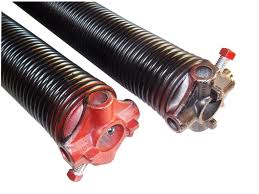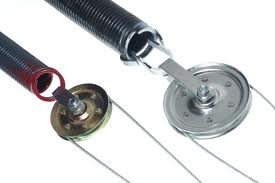Garage door springs vary. They vary in terms of components, function, safety, and brand. They also differ depending on whether they are intended for a one-piece, sectional, or rollup garage door. The most important distinction? There are two types: extension springs and torsion springs.
Which are the main differences among torsion springs and extension springs? Let’s make a very short comparison.
- Extension springs are installed on the two garage door sides, while the torsion spring is found over the garage door.
- The end sections of the extension springs are loops (of different types), while torsion springs have cones (one stationary and one winding cone).
- Torsion springs are connected with the garage door cables via the drums, while the extension springs utilize a pulley system.
- Most torsion springs are found inside tubes – called shafts, whereas extension springs do not have a protective tube.
The garage door spring considerations
Safety first. Just the fact that torsion springs are found inside the shaft makes them safer. Should they break, they don’t fly off, whereas extension springs would most likely do so – and they have, in fact, caused many accidents. Of course, this is also subject to the position of the garage door when the springs break – open or close. It all has to do with the garage door opener safety sensors. In their defense, the safety risks with extension springs are eliminated when they are laced with safety cables.
Does that mean that both extension and torsion springs are equally great? Not really. Overall, torsion springs are better than their extension counterparts. Let’s see why.
The advantage of garage door torsion springs
 Apart from the safety factor, torsion springs outlive extension springs. Once again, this depends on the spring itself. Not all torsion springs are the same. It depends on the brand, whether or not this is an oil-tempered, coated, or galvanized spring. Coated springs last more. And then, when you buy springs, you will see that some are designed to last for 20K cycles, some for more. Extension springs, though, usually last for 10K.
Apart from the safety factor, torsion springs outlive extension springs. Once again, this depends on the spring itself. Not all torsion springs are the same. It depends on the brand, whether or not this is an oil-tempered, coated, or galvanized spring. Coated springs last more. And then, when you buy springs, you will see that some are designed to last for 20K cycles, some for more. Extension springs, though, usually last for 10K.
Plus, not only will you need extension garage door springs replacement more often, but will also have to replace both springs. You see, extension springs go in pairs – since they are installed on the two sides of the door. There’s no changing out one spring now and the other six months later. It will mess with the garage door’s counterbalance.
 The advantage of extension springs is that they don’t need overhead space, whereas torsion springs do. You need to measure with accuracy and always leave enough overhead room for the torsion spring, when you install a garage door.
The advantage of extension springs is that they don’t need overhead space, whereas torsion springs do. You need to measure with accuracy and always leave enough overhead room for the torsion spring, when you install a garage door.
Torsion springs work more effortlessly than their counterparts. They keep the garage door better balanced. Extension springs make a jerking motion, leading to their early wear too. If one of the two springs wears or its coils start losing their flexibility, getting loose, the balance of the garage door will be affected. That’s never good – neither for your safety nor for the home’s security.
The 1 + more torsion springs advantage
Most residential garage doors utilize one torsion spring. But you also have the choice to add one more spring if your garage door is heavy. In fact, heavy and wide garage doors have 2 or more torsion springs to ensure the proper balance. To have the combined power needed to lift and lower the garage door – keep it open too. And while this may not sound as an advantage, it is if you think that should one of these springs break, it won’t be a big deal. Well, it would and you would have to have the broken spring replaced quickly. But the garage door will still work and it won’t collapse.
Torsion springs are more expensive than extension springs. That’s their major disadvantage. But if you invest in good – perhaps, coated springs from the start and keep the garage door – along with the spring, maintained, you won’t worry about spring-related headaches, whereas with extension springs you will.






